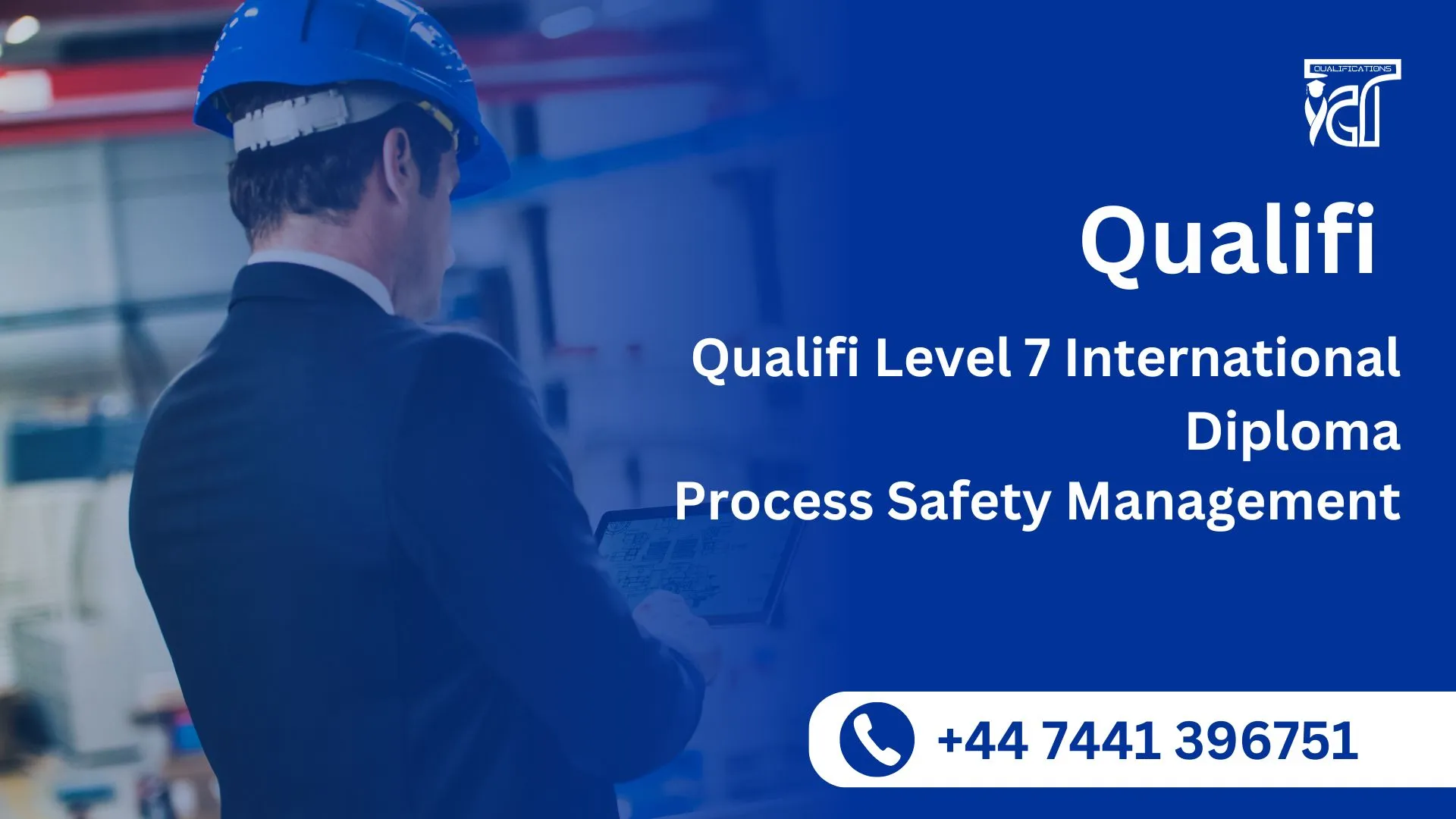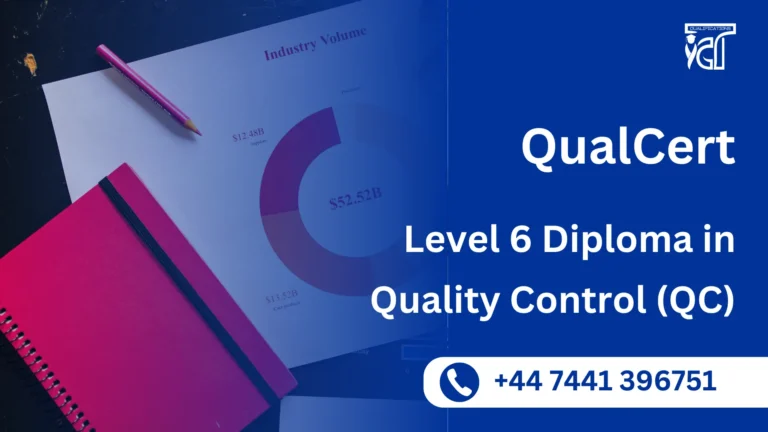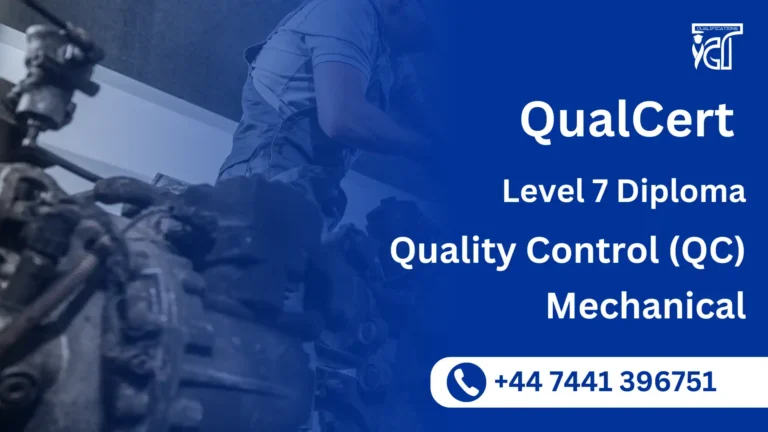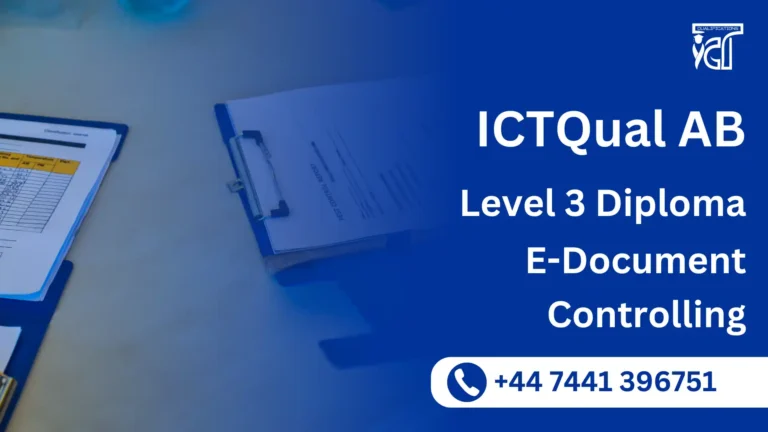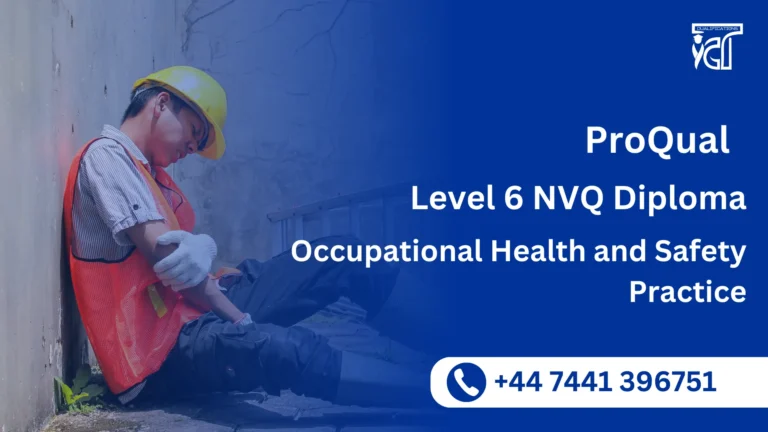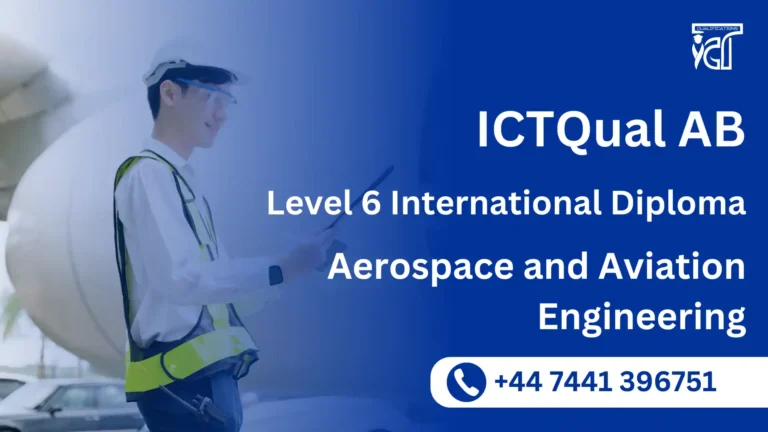In today’s fast-paced industrial landscape, process safety is paramount to ensuring the well-being of employees, protecting assets, and maintaining regulatory compliance. Whether you’re managing industrial operations, overseeing production processes, or handling safety regulations, expertise in process safety management is vital. The Qualifi Level 7 International Diploma in Process Safety Management is an Ofqual-regulated qualification designed to equip professionals with the advanced skills and knowledge needed to tackle complex safety challenges in high-risk industries.
The Qualifi Level 7 International Diploma in Process Safety Management is a postgraduate-level qualification focused on equipping learners with the expertise required to manage and enhance process safety in diverse industrial sectors. The qualification covers essential areas such as risk management, safety culture, safety leadership, regulatory compliance, and incident investigation.
This international diploma is designed for professionals working in high-risk industries globally, providing them with the expertise to improve process safety management. With the increasing emphasis on regulatory compliance, safety culture, and risk mitigation, this qualification opens up career opportunities as a Process Safety Manager, Safety Consultant, or Safety Officer in industries such as oil and gas, chemical engineering, pharmaceuticals, manufacturing, and energy.
If you are already working as a safety manager, safety officer, or in a similar role and wish to deepen your knowledge and skills in process safety management, this course will prepare you for more senior positions, such as process safety consultant or safety manager. Professionals in engineering and risk management roles who wish to enhance their understanding of process safety and gain advanced qualifications will benefit from the diploma’s focus on risk assessment, hazard analysis, and safety protocols.
The Qualifi Level 7 International Diploma in Process Safety Management provides advanced knowledge and practical skills that will allow you to take on senior roles in process safety across a variety of industries. The assignment-based format, flexible learning schedule, and Ofqual-regulated qualification ensure that you can study while working and gain internationally recognized credentials. Whether you’re a safety professional, engineer, or consultant, this diploma will prepare you to effectively manage process safety and lead initiatives to enhance safety culture, improve risk management, and ensure regulatory compliance within your organization.
Qualifi Level 7 International Diploma in Process Safety Management
Qualifi Level 7 International Diploma in Process Safety Management consists of4 mandatory units having 600 TQT and 300 GLH. Candidates must complete all of the following Mandatory units.
| Sr# | Unit Title | Credits | GLH |
| 1 | Process Safety Management Systems | 15 | 50 |
| 2 | Risk-Based Process Safety | 15 | 50 |
| 3 | Process Safety Culture and Human Factors | 15 | 50 |
| 4 | Development as a Strategic Manager | 15 | 50 |
GLH (Guided Learning Hours) and TQT (Total Qualification Time) are terms commonly used in vocational qualifications to help define the amount of time a learner is expected to spend on their studies.
1. GLH (Guided Learning Hours)
GLH refers to the number of hours a learner spends being directly taught, supervised, or supported during their course. This includes the time spent in activities such as:
- Classroom instruction
- Practical workshops
- One-on-one tutoring or mentoring sessions
- Online learning sessions with tutor support
In other words, GLH represents the time that learners are actively engaged with their instructors or learning activities.
2. TQT (Total Qualification Time)
TQT represents the total amount of time a learner is expected to invest in completing a qualification, including:
- GLH (Guided Learning Hours): Time spent on direct learning, as explained above.
- Self-Directed Learning: This includes time spent on independent study, research, assignment completion, preparation for exams, and any other work the learner does outside of direct teaching hours.
TQT is a broader measure that includes all the time required to achieve the qualification. It helps learners and employers understand the overall commitment required for the qualification.
Key Differences Between GLH and TQT:
- GLH focuses on direct learning with guidance or supervision.
- TQT includes GLH as well as independent study time and other learning-related activities.
Example:
If a qualification has a TQT of 600 hours and a GLH of 250 hours, it means the learner should spend 250 hours in direct learning (classroom, online, or tutor-led sessions) and 350 hours on independent study or research.
Learning Outcomes of Qualifi Level 7 International Diploma in Process Safety Management
1. Process Safety Management Systems
- Gain a comprehensive understanding of process safety management systems and their importance in preventing accidents and ensuring operational safety.
- Develop the ability to design, implement, and manage process safety management systems that align with industry standards and regulatory requirements.
- Learn how to effectively assess and manage process hazards, ensuring that all safety protocols are integrated into the operational processes.
- Apply key tools and techniques to analyze risks and improve safety management systems across various industries.
2. Risk-Based Process Safety
- Understand the principles and practices of risk-based process safety and how to apply them to identify and mitigate hazards in high-risk industries.
- Develop the skills to perform risk assessments and implement strategies that reduce the likelihood of accidents and incidents.
- Learn to prioritize safety measures based on risk analysis, ensuring that safety resources are allocated effectively and efficiently.
- Gain insight into process safety risk management and how it contributes to the overall safety and sustainability of an organization.
3. Process Safety Culture and Human Factors
- Gain a deep understanding of safety culture and its significance in fostering a proactive approach to safety within organizations.
- Learn how to assess and improve the safety culture in your organization, ensuring that all employees understand their role in maintaining safety standards.
- Understand human factors in safety, including how human behavior impacts process safety and how to mitigate human error through training and system design.
- Develop strategies for enhancing safety leadership, communication, and decision-making, contributing to a stronger safety culture within the workplace.
4. Development as a Strategic Manager
- Understand the role of a strategic manager in process safety and how to align safety initiatives with broader organizational goals.
- Learn how to lead and manage teams in implementing process safety strategies, ensuring that safety becomes a key component of the organization’s strategic objectives.
- Develop the ability to create and execute long-term safety strategies that enhance organizational safety performance, minimize risk, and comply with regulatory standards.
- Build the leadership and management skills necessary to take on senior roles in process safety management and influence the strategic direction of safety within an organization.
1. Ofqual-Regulated Qualification
The Qualifi Level 7 International Diploma in Process Safety Management is an Ofqual-regulated qualification, ensuring that it meets the highest academic standards. This accreditation provides credibility and global recognition, enhancing your career prospects and allowing you to stand out in the process safety management field.
2. In-Depth Knowledge of Process Safety
This diploma offers a comprehensive understanding of process safety principles, risk management, and safety culture. Learners will be equipped with the necessary skills to identify hazards, assess risks, and implement safety strategies, ensuring they are capable of managing process safety across various high-risk industries.
3. Practical, Assignment-Based Learning
The assignment-based learning format means you won’t need to sit for exams. Instead, you’ll work on assignments that simulate real-world scenarios. This practical approach allows you to immediately apply your learning, giving you the opportunity to tackle industry challenges and gain actionable insights into process safety management.
4. Career Advancement Opportunities
Completing this qualification will enhance your ability to take on more senior roles within process safety and risk management. Whether you’re aiming for positions such as process safety manager, safety consultant, or risk manager, this course will provide you with the expertise needed to excel in these high-demand roles.
5. Flexibility to Study While Working
The flexible, assignment-based structure allows learners to complete their studies at their own pace, which is ideal for professionals who wish to continue working while pursuing their qualification. This flexible approach makes the diploma accessible to busy individuals, enabling them to balance education with other professional and personal commitments.
6. Enhanced Safety Leadership Skills
The course emphasizes the development of strong safety leadership abilities, including the creation and management of a safety culture within organizations. By the end of the program, learners will be able to lead safety initiatives, foster a safety-conscious workforce, and implement effective risk management strategies.
7. Global Recognition and Career Flexibility
As an internationally recognized qualification, the Qualifi Level 7 International Diploma in Process Safety Management enables professionals to seek career opportunities in various industries globally. Whether you’re in oil and gas, chemicals, pharmaceuticals, or manufacturing, this diploma gives you the flexibility to apply your skills in any sector that prioritizes process safety.
8. Improved Regulatory Compliance Knowledge
The course provides a thorough understanding of regulatory compliance and safety standards, ensuring that learners are equipped to help organizations meet industry regulations. You will gain the knowledge required to ensure that your organization adheres to local and international safety laws, reducing the risk of non-compliance and potential legal challenges.
9. Strong Industry Demand
With increasing regulatory pressure and safety concerns in high-risk industries, there is a growing demand for professionals with advanced process safety knowledge. This qualification positions you at the forefront of industry needs, making you an attractive candidate for employers looking to enhance their safety protocols and risk management systems.
10. Higher Earning Potential
Process safety professionals are in high demand, especially those with advanced qualifications like the Qualifi Level 7 International Diploma in Process Safety Management. By completing this diploma, you position yourself for roles with greater responsibility and higher earning potential, helping you secure a better career trajectory.
Conclusion
The Qualifi Level 7 International Diploma in Process Safety Management is an invaluable qualification for professionals seeking to advance their career in process safety and risk management. From gaining global recognition to acquiring advanced technical skills, this diploma offers numerous benefits that will help you enhance your expertise and make a tangible impact in your organization’s safety protocols. Whether you’re already a safety professional or looking to transition into a high-demand industry, this course will provide you with the knowledge and skills needed to excel in the field.
The Qualifi Level 7 International Diploma in Process Safety Management is designed for experienced professionals who are looking to specialize or advance their careers in process safety and risk management. This qualification is ideal for individuals who are responsible for ensuring safety standards, mitigating risk, and improving safety processes within high-risk industries.
1. Safety Managers and Officers
This diploma is perfect for safety managers, safety officers, or individuals already working in safety management who want to deepen their expertise in process safety and risk management. If you’re looking to enhance your ability to lead safety initiatives, assess risks, and manage safety protocols in high-risk environments, this qualification will help you reach senior positions.
2. Process Engineers and Risk Managers
Engineers or risk managers with a background in industrial processes will benefit from the in-depth focus on process safety management. This course offers valuable skills for engineers looking to transition into or enhance their roles in safety management, providing them with the advanced knowledge necessary for identifying hazards, managing risks, and ensuring compliance with safety regulations.
3. Professionals in High-Risk Industries
The Qualifi Level 7 Diploma is ideal for those working in high-risk sectors such as oil and gas, chemical engineering, manufacturing, pharmaceuticals, and energy. Professionals working in these industries can apply the knowledge gained to improve safety protocols, reduce risks, and ensure a safer working environment for employees.
4. Consultants and Safety Advisors
If you are a consultant or safety advisor providing safety solutions to organizations, this diploma will enhance your ability to offer high-level expertise. It equips you with the necessary tools to advise companies on process safety, regulatory compliance, and incident prevention, allowing you to offer valuable insight to organizations looking to improve their safety standards.
5. Aspiring Safety Leaders
Mid-career professionals aiming for leadership positions such as process safety director, safety coordinator, or chief safety officer (CSO) will find this qualification helpful. This course will provide you with the leadership skills, safety culture knowledge, and incident management expertise needed to lead safety operations and initiatives in any high-risk organization.
6. Business Owners and Entrepreneurs
Entrepreneurs and business owners in industries where safety is critical can use this diploma to strengthen their understanding of process safety management. With this qualification, business owners can ensure they implement the necessary safety measures and risk management strategies within their organizations, ensuring compliance and protecting both their employees and assets.
7. Professionals Seeking Career Growth
If you’re a mid-level professional in industries related to engineering, operations, or safety, and you’re looking to move into more senior roles, this diploma will give you the skills and qualifications required for promotion. It positions you to take on higher-level responsibilities, such as overseeing safety departments, managing safety teams, or advising on complex safety issues.
8. Individuals Interested in International Opportunities
This international diploma is perfect for those looking to expand their career prospects on a global scale. Whether you are already working in a country with stringent safety regulations or aspire to work abroad, the qualification offers globally recognized credentials that will increase your job opportunities in the field of process safety management.
Conclusion
The Qualifi Level 7 International Diploma in Process Safety Management is ideal for experienced professionals looking to deepen their knowledge and leadership capabilities in process safety, risk management, and regulatory compliance. Whether you’re a safety manager, process engineer, consultant, or aspiring leader, this qualification provides you with the expertise required to excel in high-risk industries. It opens up opportunities for career advancement, international mobility, and the ability to lead safety initiatives with confidence and authority.
Entry Requirements
Register Now
Qualification Process
Qualification Process for the Qualifi Level 7 International Diploma in Process Safety Management
- Self-Assessment:
Begin by evaluating your eligibility to ensure you meet the qualification requirements, including work experience, knowledge, and language proficiency. - Registration:
Complete your registration by submitting the required documents, including a scanned copy of a valid ID, and paying the registration fee. - Induction:
An assessor will conduct an induction to confirm your eligibility for the course and explain the evidence requirements. If you do not meet the criteria, your registration will be canceled, and the fee will be refunded. - Assignments & Evidence Submission:
Provide all assignments and the necessary evidence based on the assessment criteria outlined in the course. If you are unsure of the required evidence, consult with the assessor for guidance on the type and nature of evidence needed. - Feedback and Revision:
The assessor will review your submitted evidence and provide feedback. Evidence that meets the criteria will be marked as “Criteria Met,” while any gaps will be identified. You will be asked to revise and resubmit if needed. - Competence Evidence:
Submit final evidence demonstrating that all learning outcomes have been met. This evidence will be marked as “Criteria Met” by the assessor once it is satisfactory. - Internal Quality Assurance (IQA):
The Internal Quality Assurance Verifier (IQA) will review your evidence to ensure consistency, quality, and compliance with standards. - External Verification:
The IQA will submit your portfolio to Qualifi’s External Quality Assurance Verifiers (EQA) for final confirmation. The EQA may contact you directly to verify the authenticity of your evidence. - Certification:
Upon successful completion of all checks, Qualifi will issue your official certificate, confirming that you have attained the Qualifi Level 7 International Diploma in Process Safety Management.

